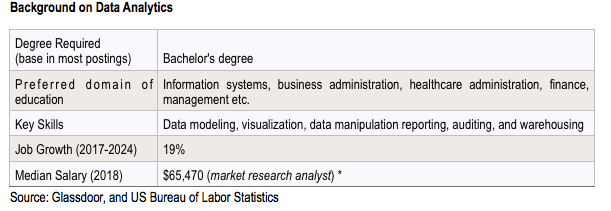Terms like “Analytics” and “Data Science” have become buzz-words these days. Everyone wants to know about the next big trend in data, as well as how they can get involved – and who can blame them? Earlier this year Glassdoor published an article highlighting the 50 Best Jobs in America, according to the job openings that it sees. Data Science was on the top of the list. Also on that list were titles including Analytics Manager, Data Analyst, Data Engineer, and Business Analyst. So, clearly jobs dealing with data are in high-demand.
Among these roles, perhaps the easiest to access for professionals looking to “cross-over” would be Data Analyst.
What do Data Analysts do?
The role of a data analyst spans across a wide array of activities which includes interpreting, analysing and visualising data that has been acquired by the organisation either by using statistical techniques or through some tool-based interface.
Apart from these roles data analysts also uses established systems and methodologies for collection of data and implementing data analyses systems.
 Many Data Analysts come into their roles with backgrounds in IT, mathematics, statistics, business intelligence, or other data-facing roles. Some such individuals already have the familiarity with numbers, but lack proficiency in the specialised software used in this industry. At the end of the day, Excel no longer cuts it. Data professionals need to be familiar with the specialised tools of the industry. Software such as Python is necessary. SQL will help with structured data, as knowledge of R will help with data mining. Data visualisation is its own science, and Tableau is one of the most commonly used tools in that field.
Many Data Analysts come into their roles with backgrounds in IT, mathematics, statistics, business intelligence, or other data-facing roles. Some such individuals already have the familiarity with numbers, but lack proficiency in the specialised software used in this industry. At the end of the day, Excel no longer cuts it. Data professionals need to be familiar with the specialised tools of the industry. Software such as Python is necessary. SQL will help with structured data, as knowledge of R will help with data mining. Data visualisation is its own science, and Tableau is one of the most commonly used tools in that field.
What are the Career prospects?
Data Analysts can work in a wide variety of fields, but one thing that is consistent across all industries is that there’s room for solid growth. As mentioned above, the projected job growth for Data Analysts alone is 19% per annum. That’s a tremendous opportunity for a numbers-focused professional that requires no new degree programs!
What are the Career Paths?
The career path of a data analyst is dependent on the industry in which they operate however the common paths of a data analyst are:
- Senior Data Analyst: Undertaking senior data analysis roles and data research
- Project manager: Managing research and data analysis project
- Business process architect: Establishing business processes which are at intersection of data analytics
- Enterprise architect / solutions architect for more technically savvy data analysts: Bringing the data-oriented interface to solutions paradigm
- Functional business partner as a HR / Finance or other line functions: Management consultant firms are also often staffed by good DAs at the mid-career level.
- Data Scientist: A natural path whereby developing predictive models and data centric pipelines
Regardless of which industry you work in, or which path you take: you still need to take the next steps and join a program that helps you get the particular software skills you need, in the shortest amount of time reasonable possible.
Our new Clinical Data Science program is designed for working professionals like you, to get you up-skilled. Plus, we’re currently offering great early-bird discounts. Join us for our upcoming information session on Career in Clinical Data Science to learn more.
Get the training you need, show it off proudly on your resume, and secure that job or promotion in your future!




